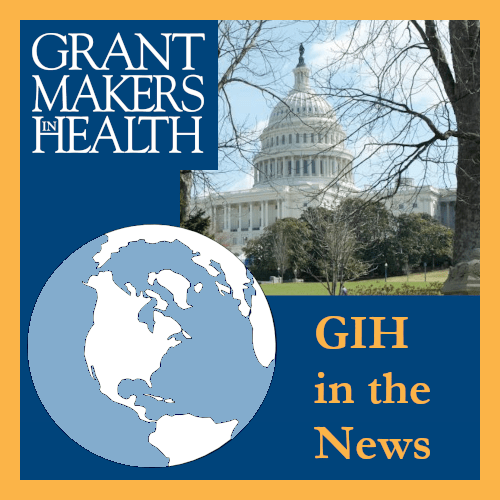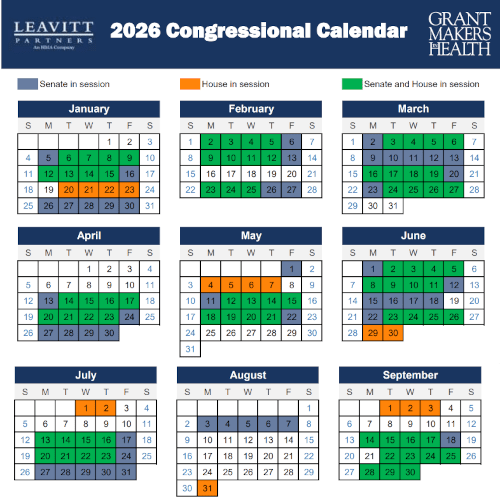Deadlines in Health-Related Executive Orders and Presidential Memoranda
This GIH policy resource details many of the health-related executive orders issued by the administration and includes a calendar of upcoming implementation deadlines.
GIH President and CEO Cara V. James Joined The Rural Impact Podcast for a Conversation about the Intersections of Policy and Philanthropy
On December 4, 2025, Cara V. James, President and CEO of Grantmakers In Health (GIH), was featured in an episode of The Rural Impact podcast. She joined Michelle Rathman, host of The Rural Impact and strategic communications advisor in health care policy, for a conversation on the intersections of policy and philanthropy, challenges with rural health funding, and more. “Policies that are impacting rural communities are…
2026 Congressional Calendar
Developed in collaboration with Leavitt Partners, this calendar tracks when each house of congress will be in session in 2026.
GIH Health Policy Update Newsletter
An Exclusive Resource for Funding Partners
The Health Policy Update is a newsletter produced in collaboration with Leavitt Partnersi and Trust for America’s Health. Drawing on GIH’s policy priorities outlined in our policy agenda and our strategic objective of increasing our policy and advocacy presence, the Health Policy Update provides GIH Funding Partners with a range of federal health policy news.
Philanthropy @ Work – Transitions – September 2024
The latest on transitions from the field.
Horizon Foundation: September 2024
The Horizon Foundation opened its 2024 Housing Justice Request for Proposals, seeking organizational partners to co-create solutions that remove barriers to obtaining and sustaining affordable, high-quality rental housing and home ownership. The first phase of co-creation will focus on three housing priorities over the next two years: expanding renter protections, sustaining homeownership, and strengthening systems to advance housing justice.
Rasmuson Foundation: September 2024
Rasmuson Foundation is accepting applications for Tier 1 and Community Support grants, now with increased award sizes. These awards form a central part of Rasmuson Foundation’s grantmaking activities, supporting nonprofit organizations in Alaska with key resources and infusions of capital.
The David & Lucile Packard Foundation: September 2024
The David & Lucile Packard Foundation published its 2023 Grantee Perception Report, which includes feedback from the foundation’s grantees through results from the Grantee Perception Survey administered by the Center for Effective Philanthropy (CEP). The report outlines five areas of improvement based on the results.
Mother Cabrini Health Foundation: September 2024
Mother Cabrini Health Foundation released its 2023-2024 Impact Report, which outlines the foundation’s mission and strategies to address the health and wellbeing of vulnerable New Yorkers. The report outlines the foundation’s grantmaking process and the direct results of this year’s grants on a statewide level. This year, the foundation awarded 514 grants totaling $172 million to support nonprofit organizations addressing community health needs and disparities across New York State.







